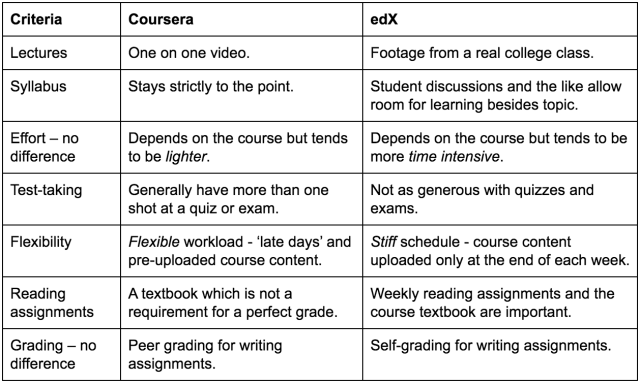It’s been a while since I last posted. I was preoccupied with finals and keeping up with my courses – both on Coursera and on edX. As of today, I’m almost done with 8 courses on Coursera. On edX however, I started my first course about four weeks ago (14.73x The Challenges of Global Poverty offered by MIT – it’s a great course). I’m still a bit of an edX rookie. Still, in this off topic post I hope to highlight the differences that I’ve experienced in course-taking on both platforms.
Coursera and edX are both huge. Coursera offers over 1800 and edX offers about 900 courses from over a hundred ‘global partners’ – schools and universities from around the world.
TL;DR version
Both these platforms are incredible for learning, but if you’re looking to learn without a hefty time commitment, go for Coursera. If you’re looking to develop a lot of depth, go for edX.
Lectures
Taking a course on Coursera is a lot like watching a YouTube tutorial series; the lectures are generally short videos tailored to the exact syllabus of the course. These videos are filmed with only the professor in frame and do not deviate from topic.
edX is not quite the same in this respect. The videos are taken inside an actual college classroom. These videos occasionally feature student discussions that provide context but are sometimes redundant.
Effort
The effort, measured in hours of commitment per week is course specific and mostly independent of platform. Most Coursera courses allow you to take a quiz a number of times before there’s a grading deadline. Some of the courses with a lighter workload can even be done casually.
edX is not that generous. A bad homework score can really hurt your grade. The exercises and quizzes tend to be more rigorous. This means that edX courses need more time to work through.
Flexibility
Most Coursera courses I have taken allow you to apply for ‘late days’ – extra days where you can scramble to complete your assignment after the deadline. At the very least, Coursera content is released beforehand. This means that I don’t have to wait for the end of Week 1 to start watching Week 2 lectures.
edX is a lot stricter. There’s no late days. If you miss a deadline, you miss it. Another thing is that lecture content is not released until the end of the week. This means that on edX, you can’t start your work ahead of time. This can hurt your final grade if something unexpected comes up.
Reading Assignments
Most of the Coursera courses I worked through only had a course textbook which was not necessary to complete the course with a perfect grade. There were no reading assignments, and the weekly quizzes only tested the material that was taught in the videos.
edX has reading assignments every week, along with a course textbook that you really need to understand the lectures. This is because the professor could – and often does, refer to material from the reading assignments.
Grading
Grading, like effort is course specific. There might be a final exam, a final project, homework submissions, tests and/or writing assignments. ‘Introduction to Guitar’, a course offered by Berklee College of Music on Coursera required me to upload audio of my guitar playing to SoundCloud – which was then graded by other students taking the course with me.
One difference though, is that edX has some writing assignments that are self-graded rather than peer graded. The idea is that you critique your own work based on the guidelines they provide you with.
If the college offering the course is something that matters to you, be sure to check out which platform offers what you’re looking for. This is because a college or university generally offers courses on only one of the two platforms (MIT and Harvard offer only on edX; Stanford offers only on Coursera).
Coursera and edX are both great platforms to learn new skills and learn about new things. Still, if you don’t have too much time to spend on the course, Coursera is probably a better option. If you want something closer to real college – with reading assignments and inflexible deadlines, edX is probably a better option.
Note that I’ve compared the free courses offered on both platforms. A Verified Certificate, which is a paid course on Coursera is typically more rigorous. I have not done any Verified edX courses yet, but when I do I’ll update this page.

